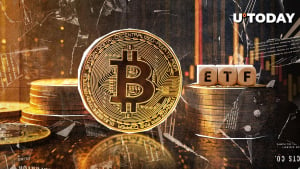Bitcoin Bull Michael Saylor Says He Will Be Buying BTC "Forever"
In a recent interview with Bloomberg, Michael Saylor, the former CEO of MicroStrategy, reiterated his unwavering commitment to Bitcoin, stating that he plans to continue purchasing the cryptocurrency indefinitely.
With his company currently holding just under 200,000 Bitcoin, Saylor's conviction seems to be unshakable.
This comes amid the burgeoning growth of Bitcoin ETFs, which have collectively amassed over 700,000 Bitcoin.
Opening the floodgates
The introduction of spot Bitcoin ETFs has been a game-changer for the cryptocurrency market, according to Saylor.
These financial instruments have provided a much-needed gateway for institutional capital, propelling a substantial amount of investment from the traditional financial ecosystem into the digital economy.
The demand for these new ETFs has consistently outstripped the daily supply from Bitcoin miners, sometimes by as much as eight to ten times.
This dynamic has contributed to a "very virtuous cycle," as Saylor describes, facilitating the digital transformation of capital.
The unshakable belief
Despite the potential for significant paper gains—MicroStrategy's holdings are now worth around $10 billion, with an approximate 70% return—Saylor remains uninterested in selling.
His rationale is rooted in the belief that Bitcoin represents the premier asset class, distinguishing itself from traditional investments like gold, the S&P index, and real estate. Saylor argues that Bitcoin's technical superiority positions it as the ultimate store of value, capable of absorbing capital from other asset classes.
This conviction is further reinforced by the notion that, unlike companies such as Apple, Google, and Microsoft, Bitcoin, as an asset class, has the capacity to hold vastly more capital, potentially up to $100 trillion.
This perspective displays Saylor's strategy of favoring the accumulation of Bitcoin over selling. He views the cryptocurrency not just as an investment but as a foundational asset in the digital age economy.
Related articles





 Alex Dovbnya
Alex Dovbnya U.Today Editorial Team
U.Today Editorial Team Vladislav Sopov
Vladislav Sopov Dan Burgin
Dan Burgin